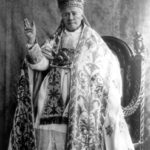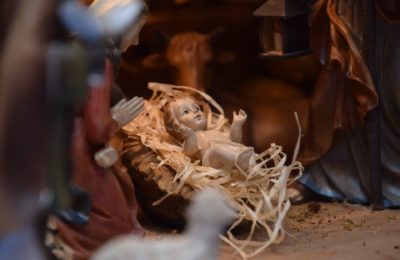“Jesus promised his disciples three things—that they would be completely fearless, absurdly happy, and in constant trouble.” – G.K. Chesterton
Are you subject to the contempt of family members and/or friends because of your Catholic Faith? If so, you are in good company. In fact, there are saints that you might be interested in as they are patrons of the group into which have been cast: those ridiculed for their piety. This group is quite large, and is the subject of today’s post with an emphasis on one particular member, Mrs. Mabel Tolkien, the mother of the English Catholic writer, J.R.R. Tolkien.
I recently read an article about Mrs.Tolkien which noted that she was estranged from her Baptist family in 1900 when she converted to the Catholic Faith. At the time of her conversion, she was a thirty year old widow with two sons (one son was the eight year old J.R.R. Tolkien). Mrs. Tolkien died just four years later from complications of diabetes mellitus. J.R.R. Tolkien attributed her early death to the stress she experienced from the familial estrangement; for the stress exacerbated the diabetes mellitus from which she suffered. He considered her a martyr for the Catholic Faith, the Faith to which he was devoted his entire life. Tolkien wrote of his mother that she was a “gifted lady of great beauty and wit, greatly stricken by God with grief and suffering who died in youth (at 34) of a disease hastened by persecution of her faith.” (source: article by Archbold, see below)
If Mabel Tolkien’s cause for canonization were taken up, and she was canonized, she would fall under the category of those saints who were ridiculed for their piety. One canonized member of this group is St. Elizabeth Ann Seton. She was disowned by her family, and thoroughly impoverished when she converted to Catholicism. If you are interested, here is a list of saints in this category with links to their stories (source):
- Agostina Pietrantoni
- Alodia
- Angela of Foligno
- Bernadette of Lourdes
- Catherine of Genoa
- Catherine of Siena
- Clelia Barbieri
- Elizabeth of Hungary
- Elizabeth Seton
- Frances of Rome
- Jacinta Marto
- Jeanne Marie de Maille
- Joan of Arc
- Kateri Tekakwitha
- Margaret of Cortona
- Marguerite d’Youville
- Mary Magdalen
- Matilda
- Nunilo
- Rose of Lima
- Teresa of Avila
- Teresa Maria of the Cross
- Zedislava Berka
- Zita
But, back to Mrs. Mabel Tolkien: I recently read an article about her in the National Catholic Register by Matthew Archbold. In this article, Archbold wrote on J.R.R. Tolkien’s belief that his mother was a martyr for the Faith. Archbold wrote:
Courageous faith in the face of persecution has inspired millions. One can’t over estimate the consequences of Christian courage. I’ve long wondered is St. Stephen’s forgiving of his murderers, his love in the face of violence had an impact on Saul who would become Paul, one of the greatest evangelists in Church history. But even the smallest acts of enduring faith can impact millions.
In 1904, a young widow with two boys died in England. Few mourned Mabel Tolkien. History would not have marked her life or passing at all had not her example of steadfastness to her faith inspired her son, who would grow up to become a literary giant. Her father, John Suffield, was a merchant married to Emily Sparrow. Together, they had seven children and ran a shop in Birmingham. When Mabel was just 18 she began seeing a 31-year-old banker named Arthur Tolkien. The two exchanged numerous letters as Arthur went off to South Africa in search of a lucrative career in banking.
In 1891, after being parted for two years, Mabel set sail alone on the ship named the Roslin Castle to be reunited with her love. When the two were reunited, they married in an Anglican Church. Two children followed. The two Tolkien boys were named John Ronald Reuel and Hilary Arthur Reuel. After a few years, she grew increasingly worried about the giant spiders, the effect of the intense heat and the danger of wild animals around the children so she left South Africa for England with the children and a promise to return in the near future.
But soon after, Arthur fell ill and died. Heartbroken but determined to bring up her children in love, Mabel settled in a rural town outside Birmingham. Many believe it was this idyllic setting that inspired the Shire in J.R.R. Tolkien’s later writings. It was Mabel who taught her children to love language, literature and art. Mabel also passed on her love of Christ. In 1900, Mabel and her two boys entered into the Catholic Church. This could not have been an easy decision as virulent anti-Catholicism was mainstream in England at that time. To be Catholic was to be un-British.
This was just 14 years after the death of Blessed John Henry Newman, whose conversion was so controversial. In fact, Mabel converted along with her sister May Incledon and joined St. Anne’s, which Newman had transformed from a gin distillery into a chapel. Mabel’s Protestant family did not respond well to her decision. Neither did the Tolkiens who were Baptist. The two sisters were vehemently urged to renounce the Catholic faith. In fact, Mabel’s sister May, at the insistence of her Anglican husband, did renounce her Catholic faith only to become a Spiritualist. But Mabel never renounced her newfound faith even in the face of ostracization, both personally and economically. The families essentially cut off the young widow whose health was fading but she persisted with the help of a priest, Father Francis Xavier Morgan, who became a father figure to the boys.
On Nov. 14, 1904, Mabel passed away from diabetes. Her son J.R.R. Tolkien was 12 years old. Many years later he wrote a letter to his own son Michael about his mother and said of her that she was a “gifted lady of great beauty and wit, greatly stricken by God with grief and suffering who died in youth (at 34) of a disease hastened by persecution of her faith.”
As she lay dying, she wasn’t so worried about her own death but about her sons and their faith. So concerned that the boys would be forced to renounce their Catholic faith by her own family or the Tolkiens, she named Fr. Francis Xavier Morgan as the boys’ legal guardian.
Mabel Tolkien’s faith perseverance had a lifelong impact on Tolkien and colored many of his most well-known stories, including The Hobbit, The Lord of the Rings, and The Silmarillion. And in turn, those stories of faith and courage have helped so many others persevere in times of trouble.
There, peeping among the cloud-wrack above a dark tower high up in the mountains, Sam saw a white star twinkle for a while. The beauty of it smote his heart, as he looked up out of the forsaken land, and hope returned to him. For like a shaft, clear and cold, the thought pierced him that in the end the Shadow was only a small and passing thing: there was light and high beauty for ever beyond its reach.
No life is small. No act of faithful perseverance is insignificant because its effects can not be fully measured by others. Only heaven can truly measure the impact of faith and love. (source)
Yes, your life is not small, and no act of faithful perseverance is insignificant (paraphrase, from article, above). If you are ridiculed for your piety, do not waiver, for as J.R.R. Tolkien wrote:
“There, peeping among the cloud-wrack above a dark tower high up in the mountains, Sam saw a white star twinkle for a while. The beauty of it smote his heart, as he looked up out of the forsaken land, and hope returned to him. For like a shaft, clear and cold, the thought pierced him that in the end the Shadow was only a small and passing thing: there was light and high beauty for ever beyond its reach.” (source, above)
There is light and high beauty for ever beyond (J.R.R. Tolkien) the reach of darkness in the Kingdom of Heaven where Mabel Tolkien, and countless others, have found their well-deserved rest.
May you have a good day.
~SCF
~Image: the Holy Mass of the Catholic Faith taken by Tressa Maciag at Tressa Maciag Photography, 2019.






